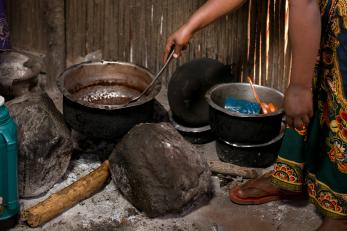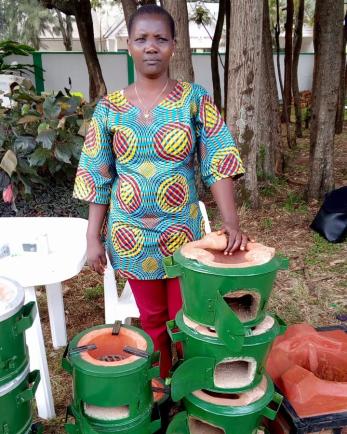Fuelling a greener future: Developing the market for fuel-efficient cookstoves in coastal Kenya

In Kenya, firewood, and charcoal reign supreme when it comes to home cooking. In rural areas, around nine in ten households typically burn the fuel on traditional stoves consisting of three stones that prop up the pot, allowing the flames to do their work underneath. It’s a straightforward method used by many Kenyans for generations, but one that is increasingly understood as unsustainable and harmful to people’s health.
That’s because this way of cooking burns fuel at a voracious rate. For those who can forage locally for firewood, their fuel may be free, but it takes a great deal of backbreaking work to collect it in sufficient quantities. What’s more, stripping trees for firewood hastens the deforestation that causes soil erosion and habitat loss for wildlife, further depleting the precious natural resources that sustain these communities. Those who can’t forage must spend up to a quarter of their household budget on buying wood or charcoal, a hefty bill for rural families on low and irregular incomes. Either way, it is still a daily challenge to keep the fires of fuel-hungry traditional stoves alive with enough intensity to cook meals quickly. Worse still, the billowing smoke they generate in often cramped living spaces creates respiratory problems and other conditions, jeopardising the health of women and children.
Improved cookstoves have a vital role to play
Whilst electric and gas-powered cookstoves are certainly less polluting, they are not yet a realistic solution for most inhabitants of low-income off-grid communities in remote regions, given the expense of gas canisters and lack of reliable electricity. But one solution that bridges the gap is the ‘improved cookstove’. Variously made from materials such as ceramic, metal and clay, these stoves still burn firewood and charcoal, but their insulated combustion chamber enables a higher temperature to be transferred to the cooking pot, burning up to 45% less fuel as a result. Whilst any cooking method that burns biomass as fuel is not ideal, fuel-efficient cookstoves comprise a pragmatic interim solution for such communities.
The unique challenges within the coastal region
While developed markets exist in more affluent central parts of Kenya, it’s not the same for communities in coastal counties such as Mombasa, Kilifi, Kwale and Taita Taveta, a region with a combined population of almost four million.
In this region, the market for improved cookstoves has so far failed to take off, for a number of interlocking reasons. Most high-quality improved cookstoves sold in the coastal region tend to be imported from central Kenya, which hikes costs for low-income consumers wary of the price tag. Whilst the few producers manufacturing locally may possess artisanal skills, they have long lacked the capacity to produce cookstoves with the efficiency and durability to match certified imported models. What’s more, without well-honed professional and business skills, as well as access to credit and links to distribution channels, local producers have struggled to break into new markets or build their production capacity to meet anticipated future demand.
In response to the identified gaps, Energy 4 Impact is collaborating the German Federal Ministry for Economic Cooperation and Development (BMZ) and the Green Climate Fund (GCF) on a four-year programme to establish sustainable markets for improved cookstoves. This initiative, which began in 2021, aims to enhance accessibility and affordability of clean cooking solutions for underserved populations.

Building a sustainable market for improved cookstoves
To achieve an irreversible transformation of the improved cookstove market in this region, Energy 4 Impact has adopted a comprehensive and holistic approach that targets barriers on both the supply and demand sides.
On the supply side, Energy 4 Impact is supporting 69 producers to increase their production capacity through guidance on efficient stove-making techniques and access to suitable tools and machinery, ensuring their manufacturing process becomes more streamlined and hence cost-effective. As rigorous quality control is central to their professionalisation, producers attended training by Kenya Bureau of Standards (KEBS) to learn about the standards for certification. Project partner Strathmore University supported producers by running a testing laboratory to ensure that their cookstoves met the fuel efficiency required within these certification standards.
Producers have also seized the opportunity to develop their business management skills through their Energy 4 Impact mentors, learning more about indispensable topics such as bookkeeping, developing business plans and customer relations. Maintaining proper business records also helps producers obtain the credit needed to acquire better machinery for example, so Energy 4 Impact has forged partnerships with a range of formal and informal lenders to ensure they perceive the investment potential of the sector. Having been primed to engage with cookstove producers, lenders have so far disbursed 31 loans. Financial institutions have also provided producers with training on financial literacy, which includes managing savings accounts, analysing business performance and assessing financing options.
As producers get in a stronger position to scale their production, Energy 4 Impact also helps them acquire the branding and marketing skills they need to reach customers more effectively, not just households but also food vendors, restaurants and institutions interested in larger models. Needless to say, local producers don’t operate in isolation: the programme also links them to the retailers, wholesalers and distributors who in turn benefit from an increased supply of product (and who also receive training that helps them professionalise and expand their operations). Once plugged into the wider regional market, producers are better positioned to thrive, increasing their production output and becoming more profitable through economies of scale.
Placing a strong emphasis on the economic empowerment of women, the programme team also supports the growing numbers of women keen to enter the production side through tailored training and mentoring. As successful women entrepreneurs invariably inspire and even train more women the impact of the project is amplified.
Such an approach not only creates skilled jobs in these low-income rural areas, but also fosters the local demand that ensures they stay there. To pique the interest of consumers, Energy 4 Impact has helped coordinate communications initiatives around the many benefits of improved cookstoves. Although cookstoves made locally tend to be cheaper than imported models, many low-income customers are still wary of their upfront cost of between USD $20-$30. Targeted marketing was deployed to set out how the greater efficiency of improved cookstoves halves the cost or labour involved in obtaining fuel over the longer term, whilst also highlighting their health, environmental and practical benefits. Media advertisements, radio outreach programmes, cooking demonstrations, and grassroots awareness events all played a part in this awareness campaign, with local community leaders, institutions and women’s groups involved in spreading the key messages.
Cookstove producers are tasting success
One woman who knows all about the challenges and solutions involved in the coastal cookstove market is Claris Mghoi, a Kenyan entrepreneur from Utange in Mombasa County, who set up a new business producing improved cookstoves in 2010. Driven by a passion for making a product with a vital role to play in reducing harm to health and the environment, her cookstoves later won prizes in exhibitions and shows. But despite her high hopes, the regional market for improved cookstoves was still in its infancy, meaning Claris often struggled to sell enough of her product.

Highly adaptable and resourceful, Claris has subsequently worked hard to transform her business. To increase the accessibility of her cookstoves to low-income customers, she now offers a hire purchase option to local customers she already knows, meaning they own the appliance outright after a negotiated sequence of payment instalments. More of her products are now sold further afield in Mombasa country since Claris recruited a sales agent working on commission. As a result, she is now selling up to 50 ready-to-use improved cookstoves per month, but she also sells energy-efficient cookstove liners made from fired earth to other producers assembling their own products. One local artisan has become a consistent buyer purchasing 150-200 liners each week.
Since formalising her business, which she has branded as ‘Natural Char Energy, Claris is in a much stronger position to access credit and showcase her products at forums and conferences. She has subsequently diversified into the production of briquettes with the aid of a grant from the Kenya Forest Service (KFS). The briquettes burn slowly and produce little smoke, making them an excellent fuel for improved cookstoves. Acting on the guidance of Energy 4 Impact, Claris has employed four workers at her established production centre which has a kiln with the capacity to produce over 700 liners per month. Looking ahead, she plans to obtain loans for industrial machinery and start her own factory production line for improved cookstoves.
The spirited entrepreneurialism of a dedicated local producer like Claris is like a spark that can ignite a whole community. Keen to get more people excited about the efficacy and impact of improved cookstoves, she has delivered addresses at the Clean Cooking Forum in 2019 and at the Kenya Water and Sanitation International Conference and Exhibition in 2023. She has also decided to help local women enter the sector by training groups in the production and assembling and installation of improved cookstoves. With her average monthly income nearly doubling to approximately $300 per month since joining the programme, Claris is now improving the life chances of her own children by channelling more money into their education.
Meeting the burgeoning demand for improved cookstoves
Claris is just one producer who has benefited from the programme, which is showing that consumers are increasingly hungry for the improved cookstove. From the project’s inception until March 2023, participating distributors and retailers have sold 82,356 improved cookstoves despite tricky economic conditions. One critical success for the programme has been the extension of distribution networks: cookstoves are now selling in parts of the coastal counties they weren’t before, making cooking safer and more cost-effective in these remote communities. Emerging data for 2022 also indicates they are proving their environmental value: the stoves sold by participating producers have collectively reduced CO2 emissions by more than 170,000 tonnes compared to traditional stoves.
Such heartening sales figures indicate that many in these remote communities are willing to embrace new cooking habits, showing what can be achieved as the markets gravitate towards more sustainable solutions. Nevertheless, the wider sector still needs further support from the government, so Energy 4 Impact is working to ensure that more favourable policies are in place to ensure the long-term growth of this market. It has engaged representatives from local and national government to advocate for the inclusion of improved cookstoves into national energy policies and establishing favourable tax regimes for stove manufacturers and distributors. Energy 4 Impact also participates in regional and international platforms to share best practices, argue for increased funding and investment, and create stronger ties with other organisations working in the clean cooking sector.
With continued support from stakeholders, government agencies, and development partners, the market for improved cookstoves can expand yet further, ensuring access and affordability for low-income households. Such efforts contribute not only to climate change mitigation but also to improved health, environmental preservation, and sustainable economic development. By embracing more fuel-efficient cooking solutions, Kenya can take a significant step towards achieving its climate goals and building a more sustainable future for all
Herbert Njiru Nyaga, Energy 4 Impact’s project lead